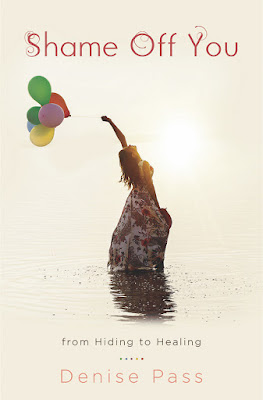My interview with Denise Pass about Shame Off You
Author of Shame Off You
 |
| Enter to win at the end of this blog post! |
Shame is an
assault on the core of who we are. It assassinates our character, minimizes our
worth, and dashes our hope. Like Adam and Eve, we often hide shame, but hiding
never heals it. Left unattended, shame can develop into a crippling reality
that paralyzes us. Like an infectious disease, shame impacts everyone . . . but
not all shame is bad.
Shame can
either be an oppressive and powerful tool of worldly condemnation or a source
of conviction that God uses to bring his people back to himself. Having the
discernment to know the difference and recognize shame in its many forms can
change the course of one’s life.
In a
transparently honest style, Denise Pass shares of her experience dealing with
shame after learning that her former husband was a sexual offender. Having
lived through the aftermath, she leads you into God’s Word where you will see
for yourself that God is bigger than your pain, shame, mistakes, and
limitations.
Shame Off You (available from Abingdon Press) shares how freedom can be found in
choosing to break the cycle of shame by learning from the past, developing
healthy thinking patterns, silencing lies, and overcoming the traps of vanity
and other people’s opinions.
Q: Can you
start us off by sharing a little bit of your own story?
I did not
realize just how significant of an impact shame had on my life until I started
writing this book. I don’t think I recognized all I was experiencing in my life
as shame. Shame affected me in profound ways—from worrying to the point of
obsession about what others thought of me to shame from my past, present and in
the future. Shame was pervasively impacting all of life: how I related to
others, processed my perception of myself and responded in social situations.
Shame was snuffing out my hope and life, and it felt like I had no way out.
Then in 2007,
God revealed to me my (then) husband was a sex offender and some of our
children were his victims. This revelation crushed us, and the ensuing shame
was crippling. I had waited for marriage and married a Christian man. We were that
homeschool family. It did not seem possible. But it was. Through that
devastating season, my children and I drew nearer to God, reading the Bible
through and clinging to His precious promises. I continued to home educate, and
we put one foot in front of the other. Through a five-year long court battle.
Through tragic new revelations. Through sorrow up on sorrow and financial woes.
God was our God through all of it and the lessons we learned as shame lost its
grip on our souls were priceless.
Now, my four
oldest are all in college and walking with God, and my youngest son who I
adopted from Russia is still home educated by the grace of God. And me? God
brought a precious man into my life who I call my Kinsman Redeemer. There’s
more about him (my “Bo”—short for Boaz) in the book.
Q: At its root,
what is shame, and why is it so detrimental to us?
There are many
roots underlying what we call shame.
Shame is the broad term used, but there are so many things interwoven in
our culture that we accept as “normal.” Shame is an accusation on our soul that
says we are not enough. News flash—we are not enough—but God is. He is our
righteousness and removes all of our sin and shame. Shame is peer pressure and
the fear of man—we would not have shame if we did not have an audience. Shame
is a label or box that imprisons our souls and steals our joy. Shame is
detrimental because it gives us a false identity and keeps us from living the
abundant life Jesus promises, distracting us from the mission we have been
called to.
Q: What are
some of the most common underlying sources of shame? Is shame always caused by
a sin a person commits him/herself?
Shame is a head
game that we do to ourselves most of the time, but there is also plenty of
social shaming that goes on—shunning and people condemning one another. While
sin invites shame into our lives as a natural consequence, shame is prevalent
within our culture. We come by it naturally and so we don’t question it.
Expectations cause shame to rise when we don’t meet them. Comparison. Pride.
These are huge contributors to the game of shame. The presence of shame in our
lives is ultimately a spiritual matter. We feel the truth behind the statement
that we are not enough. We accept this condemnation, but it can become our
vindication. We are not enough. That’s ok, because Christ is our Righteousness.
The enemy of our souls is always accusing us, but our Savior is always
interceding for us.
 Q: Shame
typically surrounds a situation the public is aware of, at least in the mind of
the person walking through it. How can the church community be more supportive
of a member suffering with shame?
Q: Shame
typically surrounds a situation the public is aware of, at least in the mind of
the person walking through it. How can the church community be more supportive
of a member suffering with shame?
Great question.
We would not have shame if we did not have an audience. It is this fear of man
and focus on self that makes us feel so very exposed as we seek acceptance and
to snuff out rejection. In my situation, I felt like the church did not know
how to handle sex abuse situations, so they didn’t. I was told to be silent.
The shame culture thrives in silence. However, being able to talk about it in a
God-honoring way and having support instead of isolation would take the sting
out of shame and turn it on its head. When we protect the violator and silence
the victims, we are propagating and promoting shame.
Q: In what ways
do we intentionally or unintentionally heap shame on others?
We live in a
society of labels. People try to define one another by false identities based
on their performance—good or bad, or their status in this life. When we move
away from our identity being in Christ, we find that our identity falls short.
Shame was introduced to man in the garden of Eden. We left perfection and chose
an insecure, shame-filled culture, instead. Discontent with our lot, comparison
and the fear or man have robbed us confidence and plagued us with shame in all
of life. Shame is also used as a tool of power by people who seek to subject
others, shaming them into submission. And again, shame is in our culture, so it
is fairly invisible. We just accept it as part of life, which can cause us to
unintentionally continue in the shame culture.
Q: How is Shame
Off You set up and designed to be used?
Shame Off You is the story of a girl who shrunk her shame. It is a guide for
recognizing the shame all around us and how to rid ourselves of shame
biblically. There is a biblical lens of Truth, Humility and Grace that we view
shame through, as well as Cycles of Shame and Redemption, a Shame Spectrum and
Shame Quiz so we can evaluate how shame is impacting our lives. There is also a
resource guide in the back of the book that covers 40 different common shames
we might encounter along with Scriptures to combat that shame.
Shame Off You systematically covers everything from feeling shunned and rejected,
to being shy, to worrying about what others thought or said about me to
traumatic shame that paralyzes us.
Q: What are the
steps to overcoming shame?
Shame distracts
us from the mission of God and keeps us from living on mission for Christ. It
causes us to focus on self and limits our worth. It hurts our relationship with
God and others and causes us to live defeated, discouraged lives. It has to be
dealt with. Recognizing shame’s presence is necessary to be able to deal with
it effectively.
From
recognition, we need to discern whether we are dealing with condemnation or
conviction. Condemnation is based on works whereas Conviction is based on
relationship. Once we know what we are dealing with, we need to consult God’s
word and use a biblical filter to evaluate our shame and then let it go. We
defeat shame not by mere words. And hiding shame does not heal it. We have to
face shame and deal with it biblically to be set free. We don’t get rid of
shame because it humbles us—but because it prevents us from living the abundant
life Christ promises, reaching those around us.
About the author:
Denise Pass, author of Shame Off You, is an award-winning CCM
recording artist and singer-songwriter, accomplished writer/blogger, speaker
and worship leader at women’s conferences as well as a worship leader on staff
at her home church. After a crushing discovery of her former husband’s hidden
life and surviving a painful divorce, she now shares an inspirational message
through her ministry, Seeing Deep Ministries, about seeing the deeper truth in
God’s word when life hurts.
Denise also founded and directed a home educational co-op for 12 years
and engaged in many educational pursuits, including forming and directing a
classical children’s choir. A graduate from the University of Maryland, Denise
now resides in Virginia, with her “Kinsman Redeemer” husband and five children.
Learn more about Shame Off You at https://shameoffyou.life/the-book. You can also
find out more about Denise Pass at DenisePass.com. She can also be found on Facebook (Denise Pass – Author/Speaker/
Worship Leader) and Twitter
(@TheDenisePass).
Comments